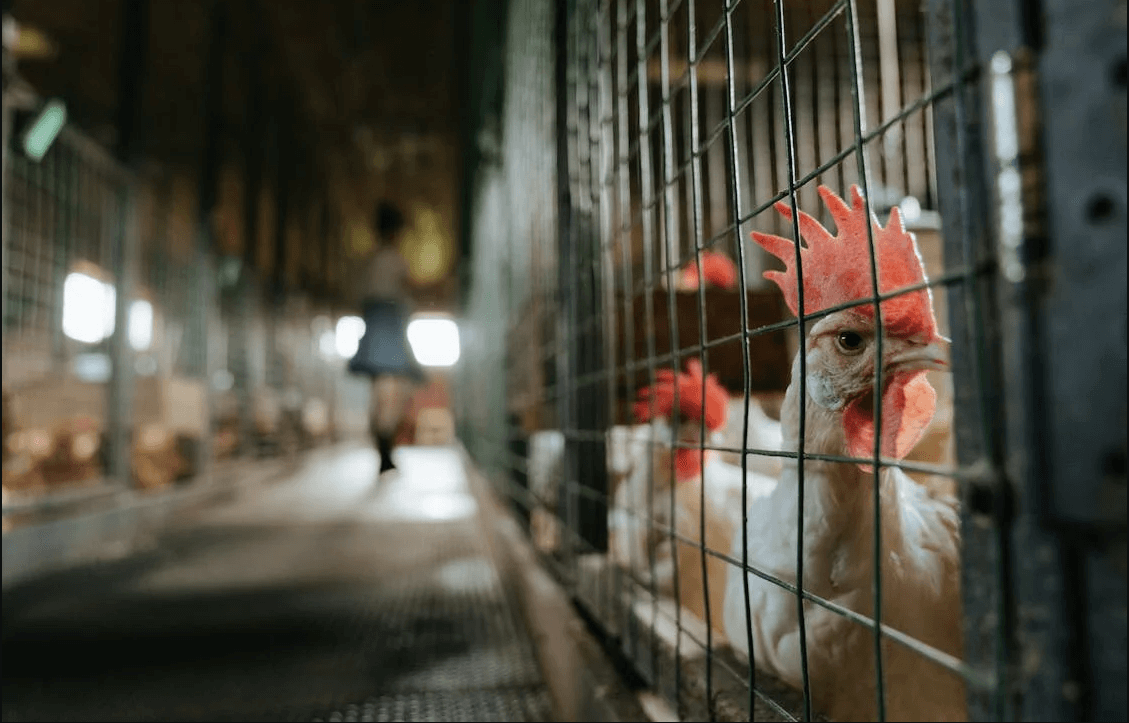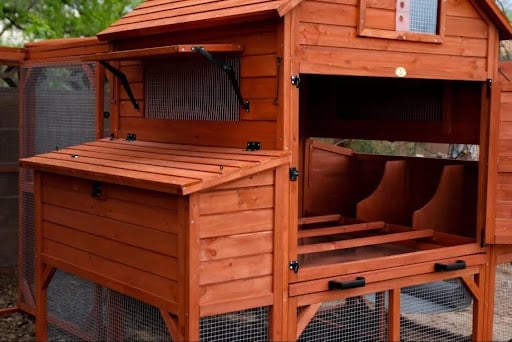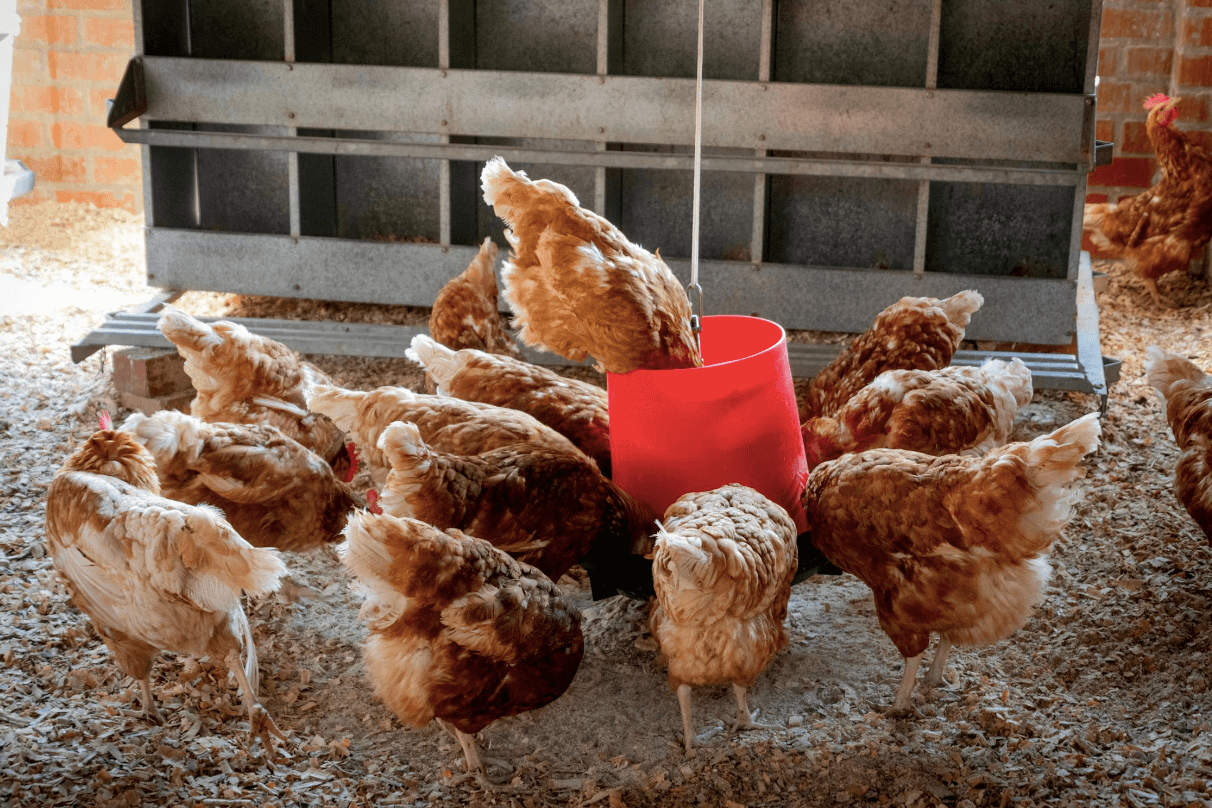All the business around equipping your chicken coop fully will amount to nothing if your chickens’ nutritional needs stay unprovided for. The science of poultry keeping revolves around keeping your chickens happy and healthy, and this includes choosing the right chicken feeder and using it properly.
Once you do your side of the bargain, your chickens will give back abundantly—feeding them properly will reflect in their egg-laying productivity, for starters.
This guide to best chicken feeding and maintenance practices explores how to do the nutrition and hygiene part right. We’ll explore topics like:
- What to look for in an effective chicken feeder?
- How to make your feeding systems appropriate and hygienic?
- How to choose feeding systems to maximize efficiency and save valuable time?
1 - Choose the Right Type of Chicken Feeder
Setting off on our little journey through the best chicken feeding practices, we cannot but start from choosing the very type of chicken feeder. This choice will determine the quality of your chicken feeding and the overall farming experience from the human perspective (we’ll get to this a bit further down below).
But first things first, whichever you choose from different types of poultry feeders, they will all tick the boxes below. They will:
- Provide a steady supply of feed
- Prevent feed wastage
- Prevent food fights
- Keep the chicken food dry
The chicken feeder, however, that’s right for your chickens is the one that will allow you to take care of your flock in the most optimal way (this is where you factor in the size of your flock and their specific nutritional needs). Next, let’s take time into consideration. The chores that take up most of your time as a poultry farmer are feeding, cleaning, and watering. It makes sense, thus, to look for less labor-intensive feeding systems.
We’ll tackle more deciding factors further on, but first, let’s take a look at the table below to compare different types of poultry feeders.
Choosing the type of chicken feeder will depend on the size of your flock, your schedule, and the time you have to spare for chicken feeding. You need to have enough feed to go around until your next refill, and that’s a huge criterion.
Another thing to consider when looking for a new chicken feeder is the money factor. If the budget is tight, you can opt out of commercial chicken feeders and opt for a DIY chicken feeder (though this is certainly more labor-intensive).
Whichever option you choose, however, you’ll have to get the quantity of food right, which takes us to our next section.
2 - Know How Much Feed Your Chickens Need
Fact: Chickens will munch on just about anything they can get their beaks on. That said, your job is to provide your flock with a constant supply of food.
These creatures are not only omnivores, but they can also eat plentily—an ample nutritionally balanced diet is also second to none if you want your birds to perform well in the egg-laying department.
Proper chicken feeding includes knowing what to feed them and in what quantities. But, how much feed exactly do your chickens need to thrive? One chicken will eat 1/2 cup of feed a day on average (that’s about 3.5-4 ounces or around 1/4 pounds). That said, dedicate your late evening chicken coop rounds to check whether your chicken feeders are topped up.
Yet, there’s more you can do in the way of meeting your chickens’ nutritional needs. Below are a few extra tips on how to take care of your birds coming from experts in the chicken-rearing space. According to the National Farm Animal Care Council’s Poultry Code of Practice, here’s how to provide proper nutritional care for your backyard birds:
- Make sure your birds have unobstructed access to feeders and that the feed is enough in terms of nutrition composition as well as quantity. Ensure your chicken feed is contaminant-free.
- Work with a nutritionist to help you craft a healthy meal plan for your backyard feathered friends. Make sure you know what not to feed chickens.
- Adjust the height of your chicken feeder to cater to the birds of different age groups.
- Check your feed and water equipment daily to make sure it’s operating properly.
- If possible, provide two feeders for your birds, one inside of the coop run and the other outside of the run. This will ensure there’s enough food to go around (even for the less dominant chickens).
Pro Tip: Your flock’s nutritional needs may increase during the winter months (you can expect up to a 25% increase), so make sure you show up for refills more often during winter.
3 - Monitor Your Feeders’ Efficiency
How do you know your feeding system is operating optimally and working to your birds’ best advantage? You size up your feeding operations on your routine chicken coop rounds while questioning the following:
- Are your feeders being used without disruptions or are there any breakdowns?
- Does every bird have undisturbed access to the feeding system?
- Is the feed being distributed evenly?
- Is the feeder positioned at the appropriate height?
Most importantly, don’t forget to check for any feed leaks, the purpose of chicken feeding systems is to provide less spillage, so you may as well keep it that way. You may also want to evaluate your feeder clean-up time to maximize the efficiency of your farm and cut down on your chicken coop maintenance operations.
4 - Make Sure Your Chicken Feeders Are Clean
Furthermore, having feed free from any cross-contamination is critically important for your chickens’ health and well-being. That said, the single most effective way to ward off infection in your chickens is cleaning your poultry feeders religiously.
By and large, all your birds are at risk from infection when your feeders are unclean, but this especially goes for younger chicks. Having your feed contaminated with mycotoxins can be the most serious and lethal for your feathered friends.
However, there are a few steps you can take to keep your farm animals safe from harm. According to the National Farm Animal Care Council’s Poultry Code of Practice:
- Always store feed in an animal and moisture-proof container.
- Make sure to test your chicken feed when you suspect it may be contaminated.
- Keep your chicken feeders free from chicken poop (more on that later).
Pro Tip: When it comes to feeders, the simpler the feeder design the easier the cleaning process, so you don't need to go fancy on your chicken feeders.
Frequently Asked Questions
Should a Chicken Feeder Be Inside or Outside?
This is open to interpretation, but it’s slightly better to keep your chicken feeder outside because if left inside, your coop can become unsanitary, due to spillages. If you decide to put your feeder outside, however, consider protecting it from the elements so it remains dry and clean.
According to the Royal Society for the Prevention of Cruelty to Animals (RSPCA), keeping your feed and water outside can attract rodents and wild birds, so sheltering it is important for safety reasons too.
How Many Feeders Do I Need for 4 Chickens?
The number of poultry feeders you’ll need is first dependent on their size. But generally speaking, you’ll need one feeder per 4 chickens. If you have a larger flock, make sure you disperse your feeders throughout the chicken run.
How Do I Stop My Chickens from Pooping In the Feeder?
You should stop your chickens from pooping in the feeder for sanitary reasons—it’s as much as inconvenient as it is a health hazard for your precious flock.
But you can control where your birds leave their droppings (you’d want them preferably off your feeders). To do this, install plenty of perches in your chicken coop as well as in the enclosed chicken run area.
Is It Best to Hang a Chicken Feeder?
You’d want to hang your chicken feeder for more reasons than one—this creates more space in your coop and keeps chicken droppings away from the feed. The general rule of thumb is to keep your hanging feeders at “eye level” to the birds, so they can spot them and eat out of them without interruptions.
Next Steps
In a nutshell, this is how to build your chicken farm feeding operations to achieve desired results—a flock that thrives and LOADS of tasty eggs. Leaning on the best industry practices, you’ll be able to feed your chickens properly and maintain the levels of hygiene required for their long-term health and well-being.
Remember that a good chicken feeder is the one that saves you time. All chicken feeders will allow you to feed a large number of birds at the same time, but of all the types, automatic feeders will allow you to feed your chickens in less time.
To free up even more of your valuable time, consider installing an automatic door opener. It will automate closing the chickens in at night, so you’re free to live your life and do more pressing tasks.
Want to streamline your chicken farm processes even further? Chicken poop trays will cut down on the time needed to do the least favorite chicken coop cleaning tasks (this is not an overstatement, see why).
That said, visit our product pages for more time-saving solutions, or check out our other articles on how to maximize the efficiency of your farm.




